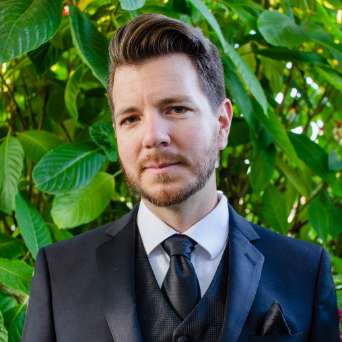“Opera is an artwork of miracles in so many ways,” said Christopher Koelsch. The company’s President and CEO surprised many in the audience with his pre-curtain announcement that the originally scheduled star soprano would be replaced with another star soprano. Minor detail: the new star soprano would be singing from the side of the stage while the choreographer performed the blocking. It was hard to be too disappointed, however, when the fill-in singer was Angela Meade, one of the most elegant bel canto sopranos on the stage today. It was, all things considered, a resoundingly successful evening of singing.
Donizetti’s Roberto Devereux (here in its company premiere) is a demanding work, requiring four outstanding singers to navigate not only the composer’s vocal demands but also the dramatic intensity of the characters. It is an exemplar of the genre that, in the right hands, can be quite persuasive. It is somewhat curious then that half of the original principals (Plácido Domingo was to have sung Nottingham) had been replaced by opening night, and likely for the better. Holding the entire ordeal together was the task of conductor Eun Sun Kim, recently appointed Music Director Designate of San Francisco Opera (quite a coup for them). It was no small thrill watching Kim encourage and tend to every need of Meade, who couldn’t have had too many rehearsals with the orchestra. Given the tempo changes and transitions, it was impressively seamless.
Meade’s voice is a powerful instrument: resonant and refined. Despite a few brief cracks on some finessed high notes, it was a thrilling reading of Elizabeth I. Meade has a true trill and easy coloratura, but it is really the range of vocal color she is able to convey which makes for a powerful dramatic experience. This served the vengeful monarch well. Meade was generous with her voice given the circumstances, offering thrilling interpolated high notes. If Meade continues with the remaining performances, bel canto fans should run, not walk, to snatch up tickets. Meade’s counterpart, who acted the role in costume, was choreographer Nicola Bowie. She was a regal presence onstage, playing off the singers and music expertly. Both had exemplary collaborators to work with.
Mezzo Ashley Dixon was a revelation as Sara, the Duke of Nottingham’s conflicted wife, whose pre-nuptial love for Roberto is the crux of the dilemma. Dixon was a vibrant stage presence whose rich voice made the character’s plight the true tragedy of the piece. As her husband, baritone Quinn Kelsey was a poignant Nottingham. With a ringing Verdi-baritone voice that recalls Sherrill Milnes, Kelsey’s long legato lines were haunting and his complete dramatic involvement brought his conflict into vivid realization.
Veteran tenor Ramón Vargas sang the title character heroically. After being on the international stage for more than 20 years, Vargas’ voice is in remarkable shape. The sound is a bit wooly on occasion, but Vargas still produces a beautiful line and ringing high notes: a winning combination for a tenor in this genre. His Act 3 aria (one of Donizetti’s great aria–cabaletta sequences) was thrilling. While Vargas can be a little stiff on stage he is a consummate operatic performer. Anthony Ciaramitaro was a menacing Lord Cecil and Michael J. Hawk a compassionate Sir Walter Raleigh.
Stephen Lawless’ clever production was aided by handsome conventional costumes by Ingeborg Bernerth and sets by Benoit Dugardyn. Set entirely inside Shakespeare’s Globe theatre, the piece played up the parallels between the drama of the Bard and drama of the situation Elizabeth I finds herself in. All the world is a stage indeed. Lawless keeps the action moving, devising transitions between reprises of musical verses that serve the story in a believable way. While it occasionally bordered on overkill, Lawless’ effort is appreciated in keeping the action vital and in perspective, being that it is a fictional invention with historical characters. The sets and props were attractive, historically informed additions complete with a huge map of England and cutout Spanish Armada. Obvious, to be sure, but thoughtful.
Kim drew some exceptionally refined playing out of the LA Opera Orchestra, which continues to improve as an ensemble. One felt occasionally like she didn’t quite let the band loose both in tempo and in volume, but it was a well-balanced and sensitive reading of Donizetti’s score. Grant Gershon’s LA Opera Chorus were a dramatically and vocally potent contributor to the action.
Still, Donizetti is about the voices and one would be hard pressed to come up with a better quartet than the four powerhouses on stage Saturday night. Thanks to happenstance, that is. It was, you could say, a miracle.




